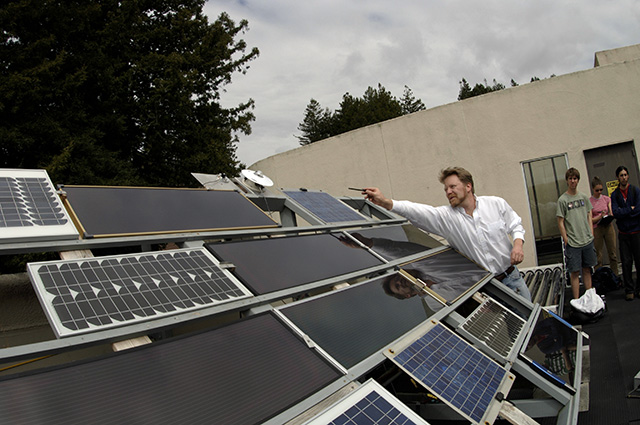
Jacobson’s work supports widespread use of off-grid power systems that provide affordable and reliable energy to low-income people in Africa and Asia. Locally, he’s involved in renewable energy projects that are relevant to California.
Jacobson became interested in renewable energy as a boy in West Virginia, where bucolic, rolling hills were juxtaposed with scars on the landscape from coal mining. “From an early age, I felt that there must be a better way to generate the energy that powers our society,” he says.
Jacobson credits a study-abroad experience in Bogotá, Colombia, with setting him on the path of exploring interdisciplinary approaches to addressing energy and poverty issues. The connections between politics, religion, economic development, and efforts to protect the environment became especially clear to Jacobson during an internship working with victims of a massive mudslide in Armero, Colombia. “By the time I left Colombia, I knew I could not work on abstract problems in a laboratory. I needed to be engaged with the wider world and do applied work aimed at making a difference in the daily lives of ordinary people,” Jacobson says.
A graduate of Earlham College in Indiana, Jacobson completed his master’s degree in HSU’s graduate program in Environmental Resources Engineering. During his time at HSU as a graduate student, Jacobson contributed to the work at the Schatz Energy Research Center, where he was part of a team that built the nation’s first street-legal hydrogen-powered car. His educational background also includes an apprenticeship in plumbing and electrical trades. “I knew from my time in Colombia that my ability to do meaningful work would benefit from a solid foundation in practical, hands-on skills,” Jacobson says.
After completing his master’s degree at HSU, Jacobson entered a doctoral program in the Energy and Resources Group at U.C. Berkeley. Building a foundation of interdisciplinary expertise was key to Jacobson’s goals as an educator, scientist, and researcher. In fact, it was at Berkeley that Jacobson began the work that would make an impact on the global level. At the time he began his Ph.D., in fall 1998, Jacobson found himself involved with addressing issues of quality assurance and consumer protection in the Kenyan solar market, which at the time had the largest market for solar electrical systems among non-industrialized countries. His research team set about field-testing the performance of nearly 150 solar modules used by rural Kenyan families. The work Jacobson published at Berkeley contributed to a body of research for which the Intergovernmental Panel on Climate Change received the 2007 Nobel Peace Prize. “For me, the work in Kenya, which combined rigorous engineering measurements and economic development patterns, and careful attention to country-specific historical trends, confirmed the value of a multidisciplinary approach,” Jacobson says.
Jacobson’s doctoral work at Berkeley enabled him to play a leading role in the Lighting Africa project, which supports the development of commercial markets for affordable and reliable solar off-grid energy systems. Sponsored by the World Bank Group, the project also includes Lighting Asia and Lighting Global. In 2013 technical standards that Jacobson helped develop through the Lighting Africa program were adopted by the International Electrotechnical Commission (IEC), making them the international industry standard. This includes an international network of test labs that rigorously test off-grid solar power systems for quality and reliability. Millions of people benefit from these quality-assured solar products that improve lighting in homes and businesses.
This background of taking a multifaceted approach to social and environmental issues forms the basis of Jacobson’s teaching and research at Humboldt State, where he returned as a faculty member in 2005. “I seek to combine theoretical rigor with hands-on learning. I have worked to incorporate projects involving real clients into my classes,” says Jacobson.
Scores of students have benefited from Jacobson’s approach. In addition to teaching, Jacobson led the creation of the Energy Technology and Policy option of the Environmental Systems graduate program, co-organized the Sustainable Futures Speaker Series, served on the Humboldt Energy Independence Fund, and was faculty advisor to Renewable Energy Student Union. Local projects his students have undertaken include designing a renewable energy system to power an off-grid educational center for the Smith River Alliance. “Many of my students have expressed enthusiastic appreciation for these hands-on learning opportunities,” says Jacobson.
Jacobson’s teaching areas include senior level energy design courses in the ERE program and graduate seminars in the Energy Technology and Policy option of the Environmental Systems graduate program. He also focuses on leading thriving research programs and, to date, has served as principal investigator (PI) or co-PI on clean energy projects that have brought more than $11 million to campus.
About the Wang Family Excellence Award
The Wang award was established in fall 1998 when then-Trustee Stanley T. Wang provided $1 million to reward outstanding faculty and administrators. The award is designed to “celebrate CSU faculty and administrators who, through extraordinary commitment and dedication, have distinguished themselves by exemplary contributions and achievements in their academic disciplines and areas of assignment.”
Other recipients are Nate Thomas, CSU Northridge; Kevin Jordan, San José State; Sora Park Tanjasiri, CSU Fullerton; and William Franklin, CSU Dominguez Hills.